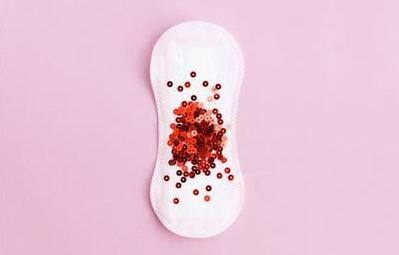Is your period missing in action?
If you or someone you know experience an irregular, or non-existent period, you’re not alone. Amenorrhea, classified as the loss of a period for more than 3 months, or not having received a period before the age of 15, affects an estimated 3-4% of the population*. While the practical convenience of not having a period could draw temptation to turn a blind eye, the reality of amenorrhea is that there may be underlying issues in need of addressing.
Functional Hypothalamic Amenorrhea is the scientific name to describe a loss of period caused by some form of stress that affects the hypothalamus of the brain. The hypothalamus is a small region of the brain, which when it gets suppressed, stops doing its job of looking after the reproductive system.

There are all sorts of different stresses that can cause Hypothalamic Amenorrhea, HA for short. The types of stress vary hugely woman to woman, some of which will be easier to identify than others.
How does stress affect my period?
When the brain registers a form of stress, it switches into a sort of self-preservation mode where suddenly, reproducing isn’t a priority anymore and therefore, blood and hormones are diverted away from the reproductive organs.
From a more scientific perspective, stress causes an imbalance of hormones that prevents periods from starting. The brain reduces or entirely stops the release of gonadotropin-releasing hormone (GnRH) from the hypothalamus. Consequently, this reduces levels of circulating Follicle Stimulating Hormone (FSH) and Luteinizing Hormone (LH) which causes less Estrogen and will cause ovulation to be paused. When ovulation doesn’t happen there is no Progesterone production. The reduced oestrogen and lack of Progesterone is what causes your period to disappear.
What causes Hypothalamic Amenorrhea?
Let’s talk about what a textbook case of Hypothalamic Amenorrhea (HA) might look like. One of the major causes of stress is energy deficiency which happens when you don’t eat enough to balance how much energy you are spending. During energy deficiency, the body doesn’t have enough energy to keep your reproductive system going. High intensity-exercise is another common cause of HA due to the stimulated release of cortisol (a stress hormone). Psychological stress caused by a life event like moving house or more chronic stress like a sick partner or family member, or a difficult job can also affect the hypothalamus. The more stress someone has, the higher their chances of losing their period. Classically, people who have HA have one or a combination of the below factors:
- Low body weight
- A low percentage of body fat
- Recent rapid and significant weight loss
- Are an elite athlete
- Show signs of under-eating
- Have some form of disordered eating
- Exercise strenuously
- Are overtraining
- Endure a stressful life event
- Have long-term psychological stress
Should I be worried about having HA?
One of the greatest effects of HA is infertility, without ovulation, there are no chances for the creation of little tots. Even if raising a family isn’t coming up in the 5-year plan HA still warrants cause for concern.
Sex hormones are also heavily involved in bone mineral density. When periods go missing in action, this indicates that the sex hormones are at a very low level and bone mass is likely decreasing. This increases the risk of stress fractures, bone breaks and osteoporosis.
Sex hormones also play an important role in keeping our hearts healthy. There are also suggestions for the support of healthy brain function.
For the population, hypothalamic amenorrhea is of growing concern as an increasing number of individuals are tending to be following what are considered obsessively clean diets. More frequently HA is being seen in recreational athletes exercising more personal health and enjoyment.
How do I get my period back?
The way to locate your period again will depend on what caused it to go missing in the first place i.e. what has made your hormone levels go low in the first place? In many cases, a number of overlapping factors may be causing the loss of menstruation. For some people, it might take a couple of months to come back, for others it could be a matter of years, don’t lose hope - good things take time. The length of time generally depends based on how intense the stress has been.
Food
For many cases of HA, the first place to look is often food, just like a car, the motor won’t tick over without fuel. Changing food behaviours can be a daunting place to start, particularly for those concerned with maintaining a certain physique be it for a sport or personal reason. However, if keeping your period is important to you, changes are inevitable. Consider the following points:
- The quality of your food - is what you’re eating high-quality. For individuals with HA, choosing foods like full fat-dairy, nuts, seeds, avocado, eggs, beans, legumes and lean meat will help to restore hormone concentrations as they are high in protein and healthy fats.
- Keep the carbs - Keeping carbohydrates in your diet can be particularly helpful for women’s health. When you cut the carbs, the brain switches into a starvation response which puts unrequired stress on the body and can affect ovulation.
- Put the vegetarian and veganism on hold - though we love to eat sustainability where we can, including animal proteins in your diet will increase the recovery process due to their high protein bioavailability. Too much to consider at this point? - how about just eggs and/or fish, the perfect blend of fat and protein to get reproductive hormones flowing again.
- Macronutrient balance - hormones are made up of fats and proteins so keeping these nutrients in balance with carbohydrates is crucial.
- Eating regularly - if you’re battling with HA, then fasting is not ideal for you. Some evidence exists to suggest fasting can increase cortisol - a stress hormone, levels in the body. Eat when you feel hungry rather than allowing yourself to feel starving.
- Gut health - it’s all very well changing the foods we are eating but how is your body handling those foods? Often we see in individuals who have been restricting food for long time periods their gut microflora may be altered meaning all the goodness may not be getting absorbed.
- Increase your calcium - for women with HA, calcium is of crucial importance to keep bone health intact. 1,500 mg per day of calcium is recommended until the period cycle is restored.
Exercise
When it comes to exercise, the importance doesn’t always lie in how often you are training, but in how you are allowing your body to recover. It’s crucial to educate yourself on how your body will react to the demands of a training session and how to fuel accordingly so long-term health is not compromised. A start could be as simple as switching out a high-intensity training session for a more restorative session such as yoga or pilates.
Psychological Stress
Finding a way to reduce your level of stress, or discovering effective coping mechanisms to deal with your stress can assist in bringing your period back. Seeking the help of a councillor or therapist, or trying out the likes of yoga, meditation and mindfulness are all great starting points.
* That does not include those who are pregnant, lactating or menopause.




